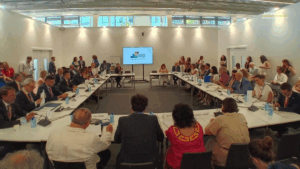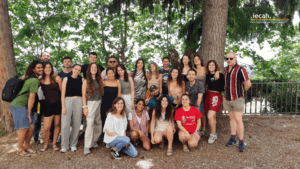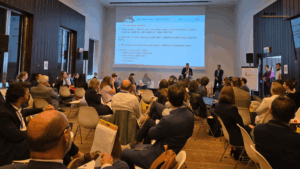Who cares about the NIE when there is Aids in South Africa?

Zapping my way to more urgent matters (the Champions League clash between A.C. Milan and Celtic F.C.), it seemed impossible to escape absurdly animated analysts, cantankerous commentators and eerily excited experts being asked weighty questions by nervous news-anchors. What had happened? War between India and Pakistan? China invaded Taiwan? Milan lost to Celtic? No, CNN, Fox News, France 24, BBC World, Sky News and I am sure every other channel that I couldn’t be bothered checking were all in a state of orgasmic elation because of the newly declassified National Intelligence Estimate (NIE) stating that Iran halted its nuclear weapons program in 2003. Oh, by the way: Al Jazeera was the only channel that continued its normal broadcast, preferring to focus on Aids in South Africa. They probably felt that Iran’s peaceful intentions had been given enough air-time on their shows already.
Admittedly, there is some news value in this story from an American strategic perspective, but why all the fuss? It’s US intelligence, after all. The report’s release was followed within 24 hours by President Bush doing a news conference, and my rule of thumb tends to be that whenever George is allowed to talk, it can’t be all that important. Otherwise, why run the risk of him saying something foolish? What was vaguely interesting in his words, however, was the insistence that Iran had the “knowledge” to develop nuclear weapons, and that that still made Tehran a public enemy. What is wrong with the White House? Don’t they even pretend to be rational anymore? If the bar is set this low (if “knowledge” makes you a proliferator), then it’s only a question of time before the U.S. Sixth Fleet gets directed towards the Netherlands, my native country, which also has such scandalous information.
Let’s have brief and selective look – more than that is not warranted when it comes to CIA fiction – at what the NIE actually says:
- “We assess with moderate confidence Tehran had not restarted its nuclear weapons program as of mid-2007, but we do not know whether it currently intends to develop nuclear weapons”.
- “Iran probably would be technically capable of producing enough HEU (highly enriched uranium) for a weapon sometime during the 2010-2015 time frame. All agencies recognize the possibility that this capability may not be attained until after 2015”.
- “We assess with high confidence that Iran has the scientific, technical and industrial capacity eventually to produce nuclear weapons if it decides to do so”.
OK, let’s start with that last pearl of wisdom. One can almost hear Dick Cheney dictating that phrase to keep open his future options for violence, but seriously: “capacity eventually to produce nuclear weapons if it decides to do so”? Forget about invading the Netherlands: Nepal has now entered the select group that belongs to this category of pure evil, a group that further consists of all other 192 states currently in existence, minus the five permanent Security Council members and Israel. The big five are no proliferation threat because they are no nuclear hypocrites: they proliferate proudly and openly. And Israel because, well, because it’s Israel.
The true news value is not the actual content of the report. First, US intelligence services are still a long way from being reliable again. Not only do they still need to improve on their information gathering and processing mechanisms, but under the current administration they cannot be considered independent by any means. Secondly, nuclear programs are complex and the boundaries between civil and military programs are never clear. It surely won’t be long before a next intelligence report comes out warning once again about Tehran’s capabilities. Thirdly, and most importantly, the report contains nothing new: the IAEA has been singing the same song for a long time, and no clear evidence of a recent nuclear weapons program in Iran has ever been found.
The fact that Iran does not fully cooperate with the IAEA and the international non-proliferation regime has many reasons, and one of them is probably that the fear of their program accords them extra international weight during negotiations and diplomacy. In that sense, Tehran is probably not all that happy with the NIE, even though Ahmadinejad’s response that this is a “declaration of victory” would suggest otherwise.
The news value that the NIE does have, however, is what this means to US policy when it comes to Iran, and even there the news is not all that startling. Although the war drums have been sounding from Washington for quite a while now, the fact of the matter is that the US is too weak to be able to do anything about Persian nuclear aspirations. Besides the paralyzing situation in Iraq, continued failure in Afghanistan and a sudden concern about the Pakistani nuclear arsenal, US economic and diplomatic power in general is waning rapidly. Military action against Iran would simply be a bridge too far, and anti-Iranian diplomacy has been running out of steam for quite a while now.
It is obvious that the declassification of this report had to have been approved by the White House, and therefore this choice can be seen as an admission of defeat by the US. On the other hand, it is also the smart move: it clears the path towards more productive negotiations – some analysts claim a deal has been struck already – on everything from the future of Iraq to the world’s oil supply. Both sides will now feel a little freer to offer deals: the US no longer needs to pretend that Iran is Lucifer incarnate, and Tehran has gained a diplomatic victory that will allow it to compromise on other things without losing face.
Dangers obviously remain. The ridiculously antagonistic rhetoric from both sides has created a cloud of mistrust and dislike that cannot be easily dispelled. If any new attempts at diplomacy fail, the return to pre-NIE levels of communication will be swift and unforgiving. For now, however, the world is a little bit of a saner place to live in, and hopefully there will be a renewed focus on issues that really matter. For example Aids in South Africa, as Al Jazeera would point out.




